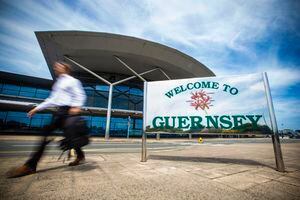Pros & cons of quarantine
Should Guernsey scrap its quarantine requirements altogether? Peter Gillson considers the potential costs and benefits

I AM typing this on the day that the new travel arrangements come into force, and even with these in place there are calls for the removal of the quarantine requirement for those arriving in Guernsey.
Various reasons are given, ranging from business, holidays and family needs to the more nebulous concept of individual freedom.
To consider the implications of reducing our border controls, it is useful to return to first principles, to what we know about Covid-19.
In essence, we know that it is:
l Highly infectious.
l Spreads by interpersonal contact.
l The incubation period is between three and 14 days.
l A large proportion of those infected show no symptoms.
l People can infect others even if they have no symptoms.
l Places where people congregate are areas of greatest potential spread.
l It has a high death rate for certain groups.
l Many survivors have long-term health issues.
Next, we need to consider testing. There is always lots of talk about testing, sometimes as being a panacea to the risks, so what do we know about it?
Testing is like a photo – a snapshot of a person’s health at the moment the swab is taken. A person might be negative, but there is no guarantee that they have not been infected and will not still develop Covid-19.
Since incubation takes at least three days, we know (Dr Brink told us) that testing on arrival will miss 100% of those who contract Covid-19 during the three days prior to arrival – in other words, all of those who contract it travelling to the island will be missed.
It is a very safe assumption that opening our borders will result in Covid-19 coming to the island in one way or another.
Since there is little chance of it going away, places where it is prevalent still need to keep precautions in place to stop its spread, and the creation of a second wave.
We see this with the restrictions in the UK and elsewhere – social distancing, wearing face masks, local lockdowns. Life in those places is not back to the ‘old’ normal, and until a vaccine is developed and widely available this ‘new normal’ will continue.
Indeed, even their ‘new normal’ will be subject to change as countries fight to keep the reproduction rate below one. A change in one direction may necessitate a change in another to keep the R-rate down. One suggestion is that in the UK opening schools may mean having to close pubs for that very reason.
As an island we are in a very fortunate position. Having eliminated Covid-19, we have been able to return to our pre-Covid normality – no wearing masks, no social distancing, all facilities are now open, schools will open without teachers having to wear masks. Many people I know in the UK look on us with an element of envy.
The key to this is the requirement, and strict enforcement, of quarantine for anybody coming into the island.
Reducing the quarantine to seven days does increase the risk of Covid-19 getting into the the island, but on the basis of Dr Brink’s statement that 94% of infections will be identified within that period, or by the day-seven testing, the increase in risk is minimal, and acceptable, with little impact on our ability to continue our pre-Covid normality.
But what about the impact of completely removing the quarantine period?
Logically, it is safe to assume that some restrictions would need to be introduced.
This is why I find those who argue that the quarantine restricts their ‘freedom’ to be a little naive. Removing quarantine will remove one restriction but would no doubt result in the imposition of many others.
Some are holding Jersey up as the example we should follow, by copying their border controls to allow easier movement to and from the island. Looking at the recent Jersey Government statements and the government website, which has copious amounts of advice, the key policies in places include:
l Maintaining one-metre social distancing anywhere outside of your household, which includes: shops, pubs, hotels (staycations) and even buying from hedge veg stalls.
l Informal social gatherings (BBQs, parties etc.) are limited to 20 people, and preferably should be held outside, while weddings are limited to 40 people, all with social distancing.
l All singing or playing of wind and brass instruments in public is strongly discouraged because these activities create a high volume of droplets which could spread the virus.
l We cannot forget the groups classed as vulnerable, the elderly or those with specific medical conditions, including those undergoing chemotherapy. While there are no absolute restrictions, the advice is very strong that extra care is needed, which means greater limitations on what they can do.
Everything has a price, and the price of removing quarantine for the few who do travel will be the imposition of restrictions, either by regulation or ‘strong advice’ on the whole population, especially for the vulnerable. I am not suggesting we would have to follow the Jersey model, but some restrictions would be needed.
For the majority of islanders who do not travel, there will be no benefit at all for having to adhere to these restrictions – so who would benefit?
The first group are those wanting to visit family and friends outside the island. I do have some sympathy, but it is very limited. Remember, there is nothing to stop anybody going to the UK – the option exists, it is just that seven-day quarantine is necessary on return.
I accept it is not nice not being able to visit family, but let’s put this into perspective. We have recently commemorated the 75th anniversary of Liberation. A period where there was no Skype, no Facetime, no phone calls and only limited Red Cross letters. This was greater isolation, and for years not months.
Some calls are from the business sector, and I have no doubt that quarantine is killing the tourist industry, but realistically any change will come too late to save this year. Quarantine may be impacting on some other businesses, but the sectors and businesses I have come into contact with are coping fine – existing business is OK, and new business being gained.
I accept that my experience is limited in scope, but the Chamber of Commerce has made similar comments.
Perhaps changes would increase business, but it could also impact negatively locally: numbers in cafes and restaurants may need to reduce as social distancing is introduced. To what degree would business be lost as locals think twice about meeting for a coffee, or having a meal out?
I admit to not having access to any detailed economic modelling, but my gut feeling is that the majority of islanders will lose more than they gain if quarantine is removed.
I do end with a caveat – removing quarantine now would be too late to significantly help out the tourist industry but it cannot continue into next summer. So if a vaccine is not found by February, we may have to bite the bullet and remove quarantine by Easter for the sake of our tourist industry, and live with different restrictions.
But for the moment let’s enjoy our almost unique normality.





